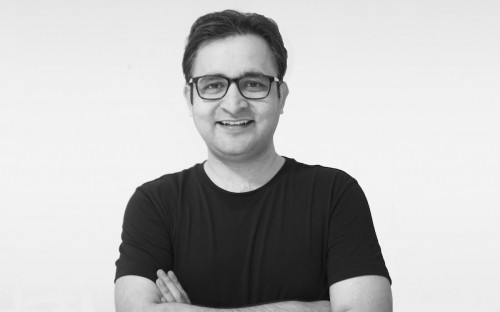After a good offer came in, he sold his business and, keen to get out of the shipping industry once and for all, he decided to go to business school.
Vikas chose Rotterdam School of Management (RSM) at Erasmus University over Oxford Saïd and Spain’s IE Business School for his full-time MBA in Europe.
“After six years in shipping and the merchant navy, I knew I had to get into a more mainstream industry,” Vikas explains. “I was interested in cleantech and Holland—as a cleantech space—had a lot going on.
“Coming from a shipping background, I was well-acquainted with Rotterdam,” he continues. “I loved the city and the culture. There were also a few of my undergrad school seniors who I knew had already studied there.”
Fast-forward eight years and Vikas is the founder and CEO of Plash Digital, a Bangalore-based digital agency that creates artificial intelligence-powered products for SMEs.
In September 2017, he launched an fully-integrated, AI-powered Customer Relationship Management (CRM) system. Now, he’s working on an AI-powered personal sales assistant which can analyze sales emails, help you find the right leads, and tell you the probability of a lead being converted.
Vikas is also the owner of a tech-focused venture capital (VC) fund in Bangalore—Azresta Ventures—supporting India’s next generation of tech-savvy entrepreneurs.
Like many others, Vikas’ journey to startup success started at business school. During the Rotterdam MBA, he was selected out of 75 students to represent the school at the Venture Capitalist Investment competition at London Business School (LBS).
“Even though I had a startup, I never knew about venture capital,” he says. “The VC competition showed me how the startup world works, and it gave me the opportunity to work with an early-stage cleantech fund.”
Through school connections, Vikas landed a job at Start Green Capital in Amsterdam. Several years later, he was back in India, determined to build something of his own. “I wanted to implement what I was telling entrepreneurs to do in Europe; to build a startup and scale up,” he says.
Vikas’ current business started out as a simple news aggregator. With a couple of engineering friends, he used machine learning to match content on mobile with interested readers. At the time, monetization was difficult—cost-per-click on mobile was low. Vikas’ app got close to a million downloads, but generated very little revenue.
So, he changed track and his team started writing their own content on themes like leadership and productivity. “We went from zero to 12 million page views in three months flat!” Vikas beams.
“Then, a lot of brands started approaching us to do native advertisement. And we started advising them pro-bono about what they were doing with their digital media.”
Soon, a fully-fledged digital agency was born. Vikas’ team combined the digital tools his team were already using in-house to create his AI-powered CRM, which helps sales-people with everything from fixing meetings to analyzing campaigns, preparing reports, and monitoring sales targets.
“That’s our main product now, and our digital agency is funding our product range,” Vikas explains. “Our main focus is on productivity and helping SMEs automate their trivial tasks. Whatever we make we are investing back into the business.”
Vikas completed his MBA in 2010. Even today, his connections to Rotterdam School of Management remain strong. His marketing manager, Deepika Singh, is a fellow Rotterdam MBA alum.
“LBS is a very finance-driven school, INSEAD is very consulting-driven, but at RSM we had a real mix of people from so many different professional and cultural backgrounds,” he says. “That opened my mind to so many different possibilities.”
What advice would Vikas give an Indian national considering an MBA in Europe? “Start networking from day one,” he says.
There’s a big difference between job-hunting as an MBA student in India and job-hunting as an MBA student in Europe. “In India there’s a two-week recruitment period,” Vikas continues, “companies come in, do interviews, and if you go to a good school and do well in the interview then you’re pretty much ensured a job in the role and industry you’re after.
“In Europe, a careers counsellor may introduce you to a set of companies, but then it’s up to you. You need to spend a lot of time meeting recruiters.
“You need to make your network strong and, for that, an MBA is very important,” Vikas concludes. “I wouldn’t be anywhere close to where I am now without it.”
RECAPTHA :
2b
d7
38
1f








